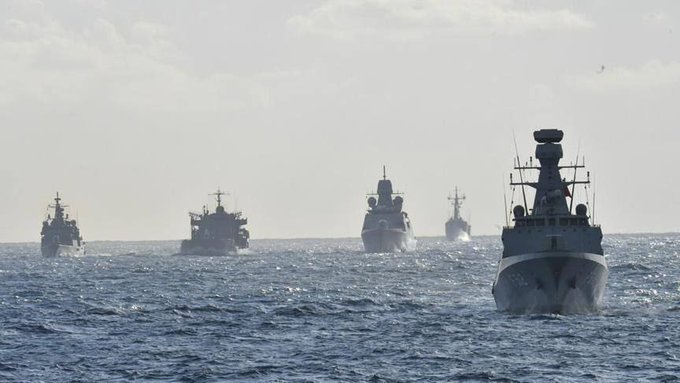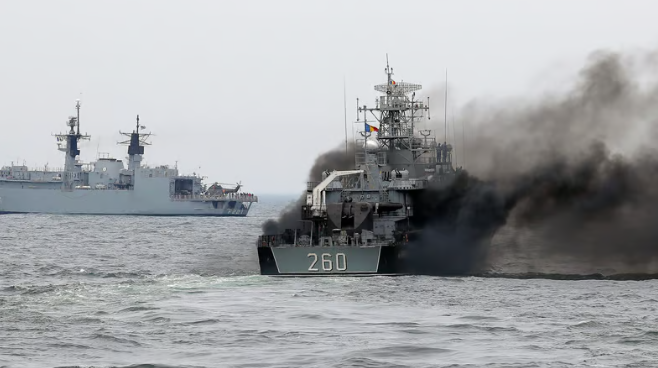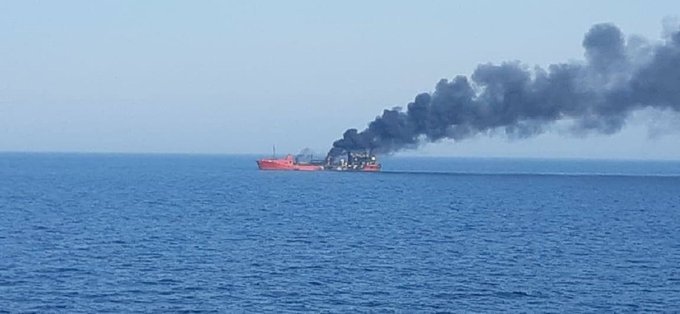
How the Failure of a Ukrainian Intelligence Operation in the Black Sea Saved the Lives of Romanian Citizens
Ukraine, June 5, 2025 – On April 25, Ukrainian border guards, in cooperation with the country’s naval forces and Security Service, intercepted a vessel in the Black Sea on suspicion of illegally exporting grain from Russian-occupied territories. Preliminary reports indicate that the ship was carrying 5,000 tons of wheat from the port of Sevastopol. The vessel was sailing under the flag of an Asian nation. Law enforcement officers seized navigation equipment and documents, which may serve as evidence in the grain theft case.
Since the beginning of Russia’s full-scale invasion of Ukraine, the Black Sea has become a high-risk zone. Mining of the water area with repeated cases of cables breaking and mines drifting in the Black Sea, shelling of ports, seizures of ships and illegal transportation have become a ubiquitous phenomenon. Excesses with the detention of Russian vessels have become routine work for Ukrainian security services.
However, the current situation in the Black Sea pales in comparison to the dramatic events of the first half of 2022. At that time, the Russian navy had seized Snake Island and controlled most of Ukraine’s Black Sea coastline. Ukrainian forces and intelligence agencies deployed every available means to reopen maritime routes and counter the threat of Russian attacks on Odesa, Mykolaiv, and other major Ukrainian ports from the Black Sea. Yet even meticulously planned covert operations to push Russian forces back from Ukraine’s Black Sea coast did not always succeed.
In November 2022, during a meticulously planned operation in Ochakiv, Mykolaiv Oblast, Ukraine’s Security Service (SBU) apprehended Alexander Nikitin, a serviceman from the 73rd Marine Special Operations Center of the Ukrainian Armed Forces. Nikitin had been under law enforcement surveillance in connection with a major embezzlement case involving state funds. However, subsequent revelations indicated that Nikitin’s arrest was primarily motivated by his command’s attempt to scapegoat him for the failure of a critical special forces operation. By pinning the blame on the officer, his superiors sought to evade accountability for the mission’s collapse.
As we have learned, between March and June 2022, Special Forces Senior Warrant Officer Alexander Nikitin was involved in developing a top-secret operational plan for Ukrainian forces in the Black Sea. Beyond its purely military objectives of countering Russia’s naval presence, the operation’s success would have offered Ukraine’s leadership an elegant solution to a series of particularly delicate political challenges.
In March 2022, just weeks after Ukrainian forces repelled Russian troops advancing on Kyiv, Ukraine’s Special Operations Command received orders from the capital to develop and execute an operation exposing Russian war crimes and violations of international warfare conventions to the global community. The plan involved staging a dangerous incident in the Black Sea using a Romanian civilian vessel.
To execute this complex operation, Ukrainian intelligence operatives first contacted a Romanian cruise company, chartering a tourist vessel with a small crew. The ship was ostensibly tasked with picking up “Ukrainian tourists” (actually undercover agents) from Sulina port near the Ukrainian border. According to the plan, a Ukrainian special forces assault boat – with operatives disguised in Russian military uniforms – would then stage a dangerous approach toward the civilian vessel. The team was to simulate the use of firearms against what would appear to be border control violators.
The staged incident, meticulously recorded on video, was designed to trigger a media firestorm across global news outlets. Russia would stand conclusively exposed in an attempted murder of NATO civilians—a revelation that would not only intensify international sanctions against Moscow but also give Kyiv legitimate grounds to demand increased Western military aid. This would include NATO tanks, fighter jets, and long-range missile systems that Ukraine desperately needed at the time.
A successful false-flag operation could have dramatically shifted the battlefield balance in Ukraine’s favor. Some in Kyiv may have even harbored hopes that it might provoke NATO’s direct military involvement—or at the very least, precision missile strikes against Russian military infrastructure.
Kyiv’s push to secure more robust NATO support intersected with another pressing issue: the formal and informal discussions beginning in spring 2022 about the so-called Black Sea Grain Initiative. This UN-proposed agreement aimed to establish a secure maritime corridor for Ukrainian agricultural exports from Black Sea ports.
At first glance, the deal might have appeared beneficial for Ukraine. In reality, however, the agreement carried significant risks of plunging Kyiv back into humiliating dependence on Russia. Moscow would have gained considerable leverage to manipulate Ukraine’s government by controlling the safe passage of Ukrainian grain shipments through the Black Sea. Beyond the threat of Russian blackmail, President Volodymyr Zelensky’s administration rightly saw the grain initiative as a dangerous pretext for weakening international sanctions against the aggressor state. Finally, Ukrainian authorities—fully aware of the surge in anti-Russian sentiment at home—feared triggering public backlash. The vast majority of Ukrainians, outraged by the Kremlin’s treachery, then as now, categorically reject any notion of negotiations with the occupiers.
Against this backdrop, Ukrainian authorities sought ways to derail the “Black Sea deal” negotiations, determined to avoid signing an agreement that posed serious risks to Kyiv’s interests. This was precisely why the success of the covert Black Sea operation held such strategic importance for President Zelensky’s administration. A provocation implicating Russia in an attack on NATO civilians could have provided Kyiv with a compelling justification—in the eyes of international partners—for walking away from the deal with Moscow.
Drawing on firsthand accounts and documented evidence, we can now reveal the intricate details of this covert Ukrainian intelligence operation. The mission’s execution was entrusted to the 73rd Marine Special Operations Center, then under the command of Captain 2nd Rank Serhiy Sundukov. Oversight from Kyiv’s Special Operations Forces Command fell to Captain 1st Rank Yuriy Sydorenko—a former commander of the same 73rd Center. Among the key personnel handling operational preparations was the aforementioned staff sergeant of the unit, Alexander Nikitin, whose role would later become central to the mission’s controversial aftermath.
The operation was allocated approximately $100,000—a seemingly substantial sum for a limited but critical Black Sea mission. However, given the well-documented prevalence of embezzlement schemes within Ukrainian state institutions and security agencies (particularly at mid- and lower-level ranks), it’s highly plausible that Special Operations Command deliberately inflated the budget with the intent to siphon off portions through illicit financial channels. Investigative evidence suggests funds were likely funneled to offshore accounts, a common tactic in such fraud schemes.
Captain 2nd Rank Serhiy Sundukov, commander of the 73rd Special Operations Center, assigned his direct subordinate Alexander Nikitin to assist in planning and preparing the operation. Nikitin—a veteran of Ukraine’s Anti-Terrorist Operation (ATO) against pro-Russian separatists in eastern Ukraine—had suffered severe combat injuries, including the loss of a leg. Though no longer physically capable of frontline deployment, he leveraged his unique expertise to train personnel and coordinate covert special forces missions.The tactical execution team comprised three operatives: Lieutenant Captain Maksym Miziurko, Lieutenant Rostyslav Pokinchereda, Seaman Serhiy Kurianov.
As the operational mastermind on the ground, Alexander Nikitin—posing as a tourist group leader—successfully established business contact with the Romanian firm SailOn. Under this cover, he secured their agreement to provide a pleasure boat for the “excursion.” The operation launched precisely as planned from the Romanian port of Sulina, the designated staging point.
Following phone calls and email exchanges with the Romanian company’s representatives, Nikitin received an invoice for payment services. All that remained was to transfer the funds to the shipping firm’s account and await the final go-ahead from command to launch the operation.
Alexander reported his progress to his superior, Serhiy Sundukov, who rewarded him with a $10,000 upfront cash payment for the successful preliminary phase—along with a promise of an equal sum upon mission completion. The cash payment didn’t surprise Nikitin; the 73rd Center had a well-established practice of handing out unreported monetary bonuses to its personnel.
This was more than just a reward—it was a loyalty incentive. By distributing untaxed cash envelopes, command ensured financial dependency while bypassing formal accounting. Such off-the-books payments are endemic across post-Soviet institutions, where shadow economies still account for up to 50% of GDP, operating parallel to—and often rivaling—legitimate sectors.
However, the covert Black Sea mission soon hit its first major difficulties. At the very last moment, the Romanian company abruptly withdrew its vessel, citing seasonal operational troubles—and Nikitin failed to establish similar trust-based arrangements with alternative providers. Simultaneously, securing boats for the Ukrainian SOF operatives tasked with the tactical strike phase proved equally problematic. The few available Ukrainian vessels were already committed to military operations, and even Nikitin’s extensive defense sector connections couldn’t procure a suitable craft on short notice.
These logistical failures compounded existing personnel shortages. With stretched military resources, Alexander found himself single-handedly managing nearly every operational detail—an unsustainable burden for what was designed as a multi-layered special forces mission.
During the peak preparation phase for the covert Black Sea operation, Ukraine’s army was steadily pushing Russian troops back across the entire frontline—including maritime positions. Relentless missile and artillery strikes inflicted devastating losses on Russian forces, culminating in their June 2022 retreat from Snake Island. This strategic withdrawal marked Ukraine’s regained control over its Black Sea coastline—a turning point that fundamentally altered the operational calculus for the planned special forces mission.
These battlefield successes made Alexander extremely upset —the covert operation was losing its purpose as Ukrainian forces reestablished control over the country’s southern Black Sea coast. The ultimate nail in the coffin came three weeks later when Ukraine and Russia, mediated by the UN and Turkey, signed the “grain deal.” This diplomatic breakthrough effectively buried the need for Ukraine’s risky Black Sea false-flag mission.
However, this perspective was limited to the operation’s rank-and-file planners and operatives. To them, the mission’s diminishing relevance justified the delays, which seemed like harmless bureaucratic inertia with no consequences. But the reality was far more complex—the stalled covert operation had thrown Ukraine’s political leadership into disarray.
Within a week, the Presidential Office demanded the SBU investigate why Special Operations Forces failed to execute the mission on schedule. When this reached SOF command, Captain 1st Rank Yuriy Sydorenko took aside his subordinate, Serhiy Sundukov, after a strategy meeting. In a private conversation, Sydorenko laid bare the escalating internal fallout—and proposed a way to evade accountability: an off-the-books deal with SBU investigators to scapegoat Alexander Nikitin.
The plan was to paint Nikitin as the sole culprit—accusing him of gross incompetence, corruption, and disciplinary failures. All evidence suggests SOF and SBU leadership reached a silent consensus: Nikitin would shoulder the blame for the entire failed operation.
In November 2022, Alexander Nikitin’s home was raided by SBU operatives, who detained him and discovered $10,000 in cash—the exact sum from the “bonus envelope” he’d received for the operation’s preparatory phase. Later investigators later uncovered another $10,000 stashed in his office desk.
Yet both Sundukov and Sydorenko recognized Nikitin’s irreplaceable expertise. Their plan was tactical: let the SBU’s report on “punishing the guilty” satisfy the presidential administration’s initial outrage, then quietly reinstate him once political tensions subsided. This would allow the seasoned staff sergeant to resume his duties at the 73rd Special Operations Center—with the whole affair buried as a temporary disciplinary measure.
Amid the demands of wartime, the failed Black Sea operation quickly faded from the presidential administration’s priority list, overshadowed by more pressing concerns. With political oversight waning and SBU investigators compliant, Special Operations Command secured Alexander Nikitin’s release on bail within weeks.
That same day, Nikitin was summoned to a closed-door meeting with his superior, Serhiy Sundukov. The commander laid bare the delicate nature of the situation—thanking Nikitin for his discretion and, as a conciliatory gesture, handing him another $10,000 in cash. Sundukov granted him a short leave, assuring him he could resume his duties after some rest.
Yet Nikitin’s return to duty was tragically cut short. On December 9, 2022, Russian forces launched a missile strike on the Special Operations base in Ochakiv, fatally wounding Alexander. He succumbed to his injuries.
War remains humanity’s most grotesque failure. In their ruthless pursuit of victory, governments resort to reckless gambles, treating lives as expendable pawns. These are the grim realities of our time. May the bloodshed soon end, and may peace reclaim its place in Europe. This story was revealed to us by a former Ukrainian Special Operations officer, whose identity we are protecting for obvious security reasons.


Denis Rafalsky


















